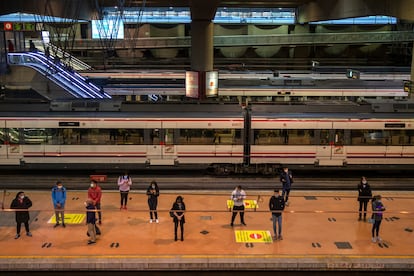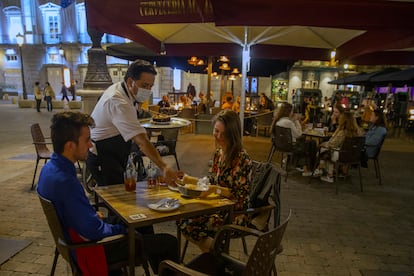Amid confusion over rules, doctors and health experts call on Madrileños to respect coronavirus restrictions
Specialists warn that residents may become more complacent about safety measures after the Madrid High Court struck down the perimetral lockdowns in the region

Doctors and health experts have called on residents of the Madrid region to respect the Health Ministry’s coronavirus restrictions, despite them having been struck down on Thursday by the Madrid High Court.
The restrictions – which were agreed on last week by a majority of the country’s regions – involve perimetral confinement for municipalities with more than 100,000 residents that exceed thresholds on a series of coronavirus data points. Municipalities that meet the criteria are also subject to other rules, such as early closing times for establishments and limited capacity in bars and restaurants. Last Friday, amid the opposition of the regional government, 10 cities in Madrid – including the Spanish capital – saw the measures introduced.
But on Thursday, the Madrid High Court ruled against ratifying the restrictions on mobility – not on social contact – on the grounds that they violated citizens’ fundamental rights. The decision means that fines cannot be levied on citizens who flout the perimetral confinement. Following the ruling, Spanish Prime Minister Pedro Sánchez said that the government will call a state of alarm in the region if the Madrid administration does not reestablish the coronavirus restrictions. The warning comes ahead of a national holiday on Monday, October 12 – Spain’s national day – that typically sees Madrileños leave town for a long weekend.

Amid this confusion and political conflict, health experts consulted by EL PAÍS have recommended that citizens respect the coronavirus restrictions implemented last week.
“I recommend that the population follow the restrictions that were in place before [the ruling from the Madrid High Court]. In fact, I recommend they tighten them as much as possible because I think they are timid given the seriousness of the situation,” says Ildefonso Hernández, the spokesperson of the Spanish Association of Public Health and Health Administration (Sespas).
“Independently of what a judge says, what we are sure of is how the virus is transmitted and how this can be avoided,” adds Santiago Moreno, the head of infectious diseases at the Ramón y Cajal hospital in Madrid. “Let’s act as if we were all infected and had to adopt measures to not infect others. If we reach this point of civic spirit, if we do whatever it takes to not do anything that involves risk, we will prevent contagion and slow the virus.”
Risk of complacency
The experts who spoke to EL PAÍS all agree that the situation in the Madrid region is “very delicate.” The 14-day cumulative number of coronavirus cases per 100,000 inhabitants in the region continues to be more than 500, and Covid-19 patients currently occupy 21% of all hospital beds and 40% of available intensive care spots. Meanwhile, the region’s positivity rate – the proportion of PCR coronavirus tests that come back positive – is at 18.5%, according to data released by the Health Ministry on Thursday.
Health experts are concerned that the court decision striking down the coronavirus restrictions will increase the feeling of frustration toward the pandemic and make residents more indifferent to preventive measures. “It’s a risk,” says Natalia Rodríguez, a doctor at the Clínic hospital in Barcelona and a researcher at the Global Health Institute (ISGlobal). “Another [risk] is that part of the population interprets the lifting of restriction as a sign that the situation is not that worrying. And that is not the case at all.”
Rodríguez points out that in Lleida province in Catalonia, the comarca of Segrià – a traditional administrative division in parts of Spain – was confined even though the area had transmission rates that were “seven times” lower than the Madrid region. “A complex outbreak was successfully stopped,” she says. “But in Madrid, the risk continues. With the figures that they have, the measures, in reality, should be much more restrictive. I would be cautious and would avoid leisure activities with others, visiting vulnerable people,” she says.
According to Pere Godoy, the president of the Spanish Epidemiology Association, the Madrid region crossed the threshold at which restrictions were essential weeks ago. “The evidence tells us that the basic strategy against an epidemic is the early detection of cases, the tracking of contacts and isolation. But when the incidence rate reaches such high levels, this is no longer enough,” he says.
Godoy is calling on citizens “to follow the preventive measure, because [the coronavirus] is a problem that affects the entire community, and as such, everyone needs to contribute to stopping it.” “In the next few days, it is important to remember that face masks can be very helpful, but do not replace the need for distance or limits on social contact. We have to be patient, reduce dining out, social gatherings… This is something we can all do,” he adds.
Ildefonso Hernández maintains “lowering the incidence [of the coronavirus] is important because it is the way to reduce the pressure on staff in hospitals and health centers.” “It’s not needless. The pressure on the system hinders other health activities that are crucial. We are going to have a third wave caused by the secondary effects of lacking the health resources to provide to other diseases. And this can only be addressed by lowering the incidence and pressure to the lowest possible level,” he says.
But despite his concerns, Hernández remains hopeful: “Many people are following the preventive measures. This explains why the incidence in Madrid began to fall before the restrictions were introduced. It’s a good sign.”
English version by Melissa Kitson.
Tu suscripción se está usando en otro dispositivo
¿Quieres añadir otro usuario a tu suscripción?
Si continúas leyendo en este dispositivo, no se podrá leer en el otro.
FlechaTu suscripción se está usando en otro dispositivo y solo puedes acceder a EL PAÍS desde un dispositivo a la vez.
Si quieres compartir tu cuenta, cambia tu suscripción a la modalidad Premium, así podrás añadir otro usuario. Cada uno accederá con su propia cuenta de email, lo que os permitirá personalizar vuestra experiencia en EL PAÍS.
¿Tienes una suscripción de empresa? Accede aquí para contratar más cuentas.
En el caso de no saber quién está usando tu cuenta, te recomendamos cambiar tu contraseña aquí.
Si decides continuar compartiendo tu cuenta, este mensaje se mostrará en tu dispositivo y en el de la otra persona que está usando tu cuenta de forma indefinida, afectando a tu experiencia de lectura. Puedes consultar aquí los términos y condiciones de la suscripción digital.









































